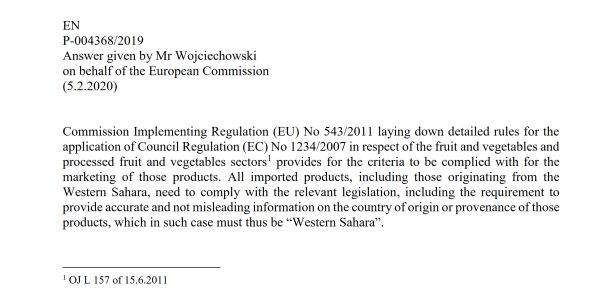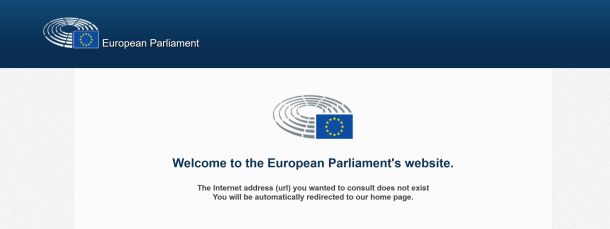Le département des affaires étrangères de l'UE a invité WSRW à prendre part à un processus de consultation concernant les négociations commerciales UE-Maroc couvrant le Sahara Occidental. Bien qu'en principe toujours ouvert au dialogue, WSRW a dû décliner.
"Western Sahara Resource Watch souhaite maintenir un dialogue étroit avec toutes les institutions de l'UE et les États membres, comme nous l'avons fait au cours de la dernière décennie. Nous continuerons à le faire à l'avenir. néanmoins pour la première fois, nous avons refusé une proposition de rencontre avec le service européen pour l'action extérieure" a déclaré Sylvia Valentin, présidente de Western Sahara Resource Watch.
Elle a expliqué que ce sont des circonstances exceptionnelles. WSRW est préoccupé par le manque de clarté sur le but de la réunion, considérant qu'un accord avec le Maroc a déjà été paraphé, et que l'organe représentatif du peuple du Sahara Occidental n'a pas été invité à discuter formellement de son consentement à un accord qui couvre le territoire du Sahara Occidental.
"Par souci de transparence, WSRW souhaite publier sa correspondance au SEAE en expliquant pourquoi nous n'avons pas pu accepter l'invitation", déclare S. Valentin.
Retrouvez le dernier courrier de WSRW au SEAE ci-dessous, envoyé le 5 février 2018:
Thank you for your reply. We very much appreciate your invitation, yet regretfully, we will have to decline. Please allow us to elaborate – as we presume that in the spirit of consultation, we can at least state our reservations.
While the exercise of consulting concerned stakeholders is laudable, we fail to see the purpose of such a process given the current state-of-affairs.
The Court of Justice of the European Union established in its judgment of 21 December 2016 that consent of the representatives of the people of the territory must be obtained. From what we understand, the negotiations with the Government of Morocco are now finished, and the agreed text has been initialed. The Government of Morocco does not represent the people of the territory. It is clear that no consent has been received, as the Court required. We do not see the point of any consultation on a deal that lacks the approval of the people of the territory. On that, we refer to the letter of Saharawi CSOs unanimously condemning the EEAS and Commission’s approach thus far.
That this process is supposedly centered on “the socio-economic development of the people living in Western Sahara” is furthermore remarkable, as that line of argumentation was found to be invalid by the Court. Article 106 underscores that there is no need to determine the benefits of the implementation of an agreement – what is important is that the people of the territory have consented to it. Please also note the difference between the concepts of the people of the territory – the original inhabitants - versus the people living in the territory; at present that consists of a large majority of Moroccans that were attracted to locate to Western Sahara by financial and economic incentives created by the Moroccan government.
WSRW does not want to contribute to what appears to be an attempt to legitimize a process whereby an agreement covering a territory’s resources is initialed with a Government that has no legal claim to the territory, without as much as asking the people of that territory whether they agree or not at an appropriate time: namely before the start of the negotiation process.
Accordingly, as it stands, we will respectfully have to decline. Should the EEAS and Commission consider an approach that is in line with the people of Western Sahara’s right to self-determination and in respect of their right to consent, we will be happy to meet.
Kind regards,
Sara Eyckmans
La Commission de l'UE recule sur l'étiquetage des produits du Sahara
Quelle est la position de l'UE sur l'étiquetage des produits du Sahara Occidental occupé ? La Commission européenne a publié pour la troisième fois une réponse à une question parlementaire sur le sujet, mais la dernière version ne répond pas à la question.
Pourquoi cette déclaration de l'UE continue à disparaître ?
Une clarification de la Commission Européenne sur l'étiquetage des produits du Sahara Occidental a été publiée, puis supprimée, puis publiée à nouveau et a été supprimée à nouveau des sites Internet de l'UE.
Confirmation: les produits du Sahara Occidental à étiqueter comme tels
Il y a deux semaines, la Commission européenne a annoncé que les produits du Sahara Occidental doivent être étiquetés comme tels, pour retirer cette déclaration dès le lendemain. Aujourd'hui, la Commission réaffirme sa position initiale.
Retournement spectaculaire de la CE sur l'étiquetage du Sahara
Le 5 février 2020, la Commission européenne a annoncé que les produits du Sahara Occidental devraient être étiquetés en conséquence. Mais environ 24 heures plus tard, toutes les traces de cette déclaration ont été supprimées des sites Web de l'UE.



